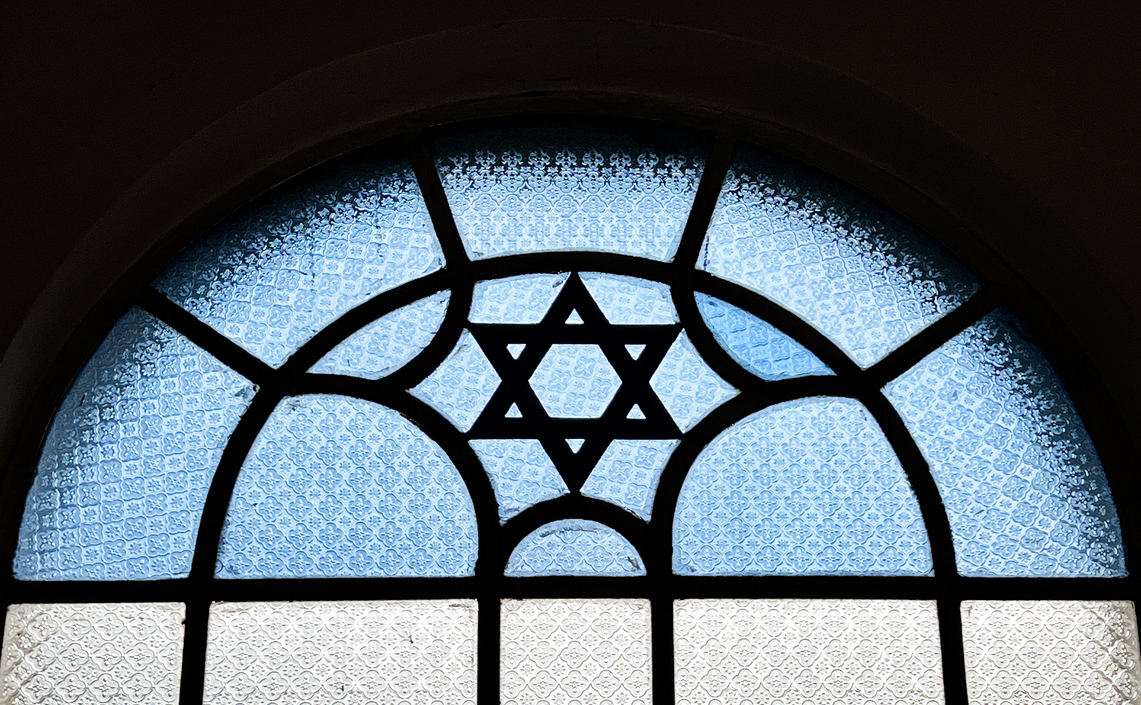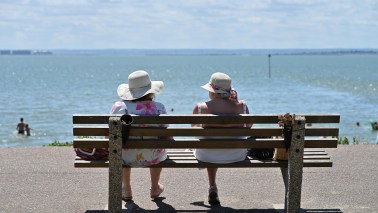On Saturday, I went to the synagogue in Béziers. I was motivated by defiance, sentiment, and an urge to demonstrate solidarity, but hardly from any rekindled religiosity. I’ve never had any to be rekindled. Like my namesake, the late Dr Jonathan Miller, said in Beyond the Fringe, ‘I’m not really a Jew… but I’m Jew-ish; not the whole hog.’
I grew up in North London when there were still some scars from the second world war. Bombsites. Prefab homes in Dollis Hill. I knew about the Holocaust but it seemed remote, impossible. My family had arrived in Britain in the late 19th century, exiles from the pogroms in Latvia. If any members of my family had perished in the camps, it was never mentioned. I really can’t recall much anti-Semitism. Although it did feel odd at school being asked for my Christian name – a question no longer posed.
I have no kippah or tallit. I was given both, and a prayer book in Hebrew
I had a bar mitzvah, for the sake of my grandmother, but we were hardly observant. We ate bacon for breakfast. I’d been sent to the home of an exiled Hungarian woman in Golders Green to learn Hebrew but I was useless. On my big day at the orthodox synagogue in Temple Fortune, I stumbled through the reading from the Book of Deuteronomy with the rabbi whispering the lines into my ear.
Subsequently, I returned to a synagogue only twice. Once to get married by an accommodating rabbi at Temple Beth El in Detroit, to a Polish Catholic whose father was rabidly anti-Semitic and who refused to attend, announcing that the marriage wouldn’t last two weeks. (That was 50 years ago. We’re still married.) And subsequently, 25 years ago, for the funeral of my father, a physician who had by then emigrated to the United States.
The synagogue in Béziers is a modest affair, spiritual home to a tiny community. Jews have been in Béziers since Roman times, but the golden age of the Biterrois Jews was the Middle Ages, when the city on a hill was nicknamed ‘Little Jerusalem.’ This era ended in 1209 during Pope Innocent III’s Albigensian Crusade against the Cathar heresy, when the entire population of Béziers, including 200 Jews, was herded into the cathedral and burned alive, an incident admitted in the Catholic Encyclopaedia to have been excessive.
‘Kill them all, God will know his own,’ was the order given by Arnaud Amalric, the Cistercian abbot who commanded the papal army. A handful of Jews escaped and eventually returned from Catalonian exile. The massacre in Béziers was the precursor of holocausts to come. During the second world war, hundreds of Jews were deported by French police, from Béziers and nearby towns and villages, to perish in extermination camps.
The contemporary killing of Jews in France is so common as to be practically unremarkable. Particularly shocking, west of Béziers in Toulouse, at the Ozar Hatorah Jewish day school, three children and a teacher were killed by an Islamist. But since the events in Israel last week, the fear has been palpable, as Gavin Mortimer wrote here last week.
I figured it would not be possible just to show up for the sabbath service. So I phoned the synagogue on Friday morning, before the sabbath, to let them know I was coming. They didn’t know me and were nervous. Béziers has a large Muslim population, overwhelmingly sympathetic to the cause of Palestine. A pro-Hamas demonstration on Thursday had been banned. On Friday morning tensions rose further as a schoolteacher was assassinated by a Chechen Islamist in Arras.
The president of the synagogue was consulted. The word eventually came back that I would be welcomed, but should bring my identity card. When I arrived, I was subjected to a polite but thorough search. Surveillance cameras were everywhere. But once inside, the welcome was warm. I was something of a curiosity, I think.
It was not an experience that resembled any of my previous encounters with my nominal faith. My father’s funeral was in a wealthy, predominantly Jewish suburb of Chicago. It was a crisp January morning, the trees blanketed in pristine snow. The reform synagogue was majestic, a veritable temple, the rabbi a woman, the mourners affluent.
Béziers’s orthodox synagogue is much more modest, with plastic chairs, the only woman sitting separately. The synagogue is in a hôtel particulier, just by the bustling central market. The congregation was not evidently wealthy. It was also much smaller than usual. In the light of events, many were scared to come, I was told.
There are but one hundred Jewish families left in Béziers, a city of 80,000. The congregation on Saturday morning comprised 14 men, with an average age, I’d guess, of 70. I have no kippah or tallit. I was given both, and a prayer book in Hebrew with a translation in antiquated French on the facing page. I found the service almost impossible to follow. The translation didn’t help much. But the passion of the recital was moving. Every member of the congregation, except me, took turns reading the prayers.
Where were the young people? Where were the children? This didn’t look like a community that had much of a future. Many of them have emigrated to Israel, the congregants told me. In his sermon, the Rabbi evoked the Book of Genesis and the consequences of man partaking of the fruit of the tree of knowledge, and how man should transcend violent emotions. It was an unmistakable plea that Jews should refrain from making war. It was not a message received with equanimity by many congregants.
I didn’t discover a spiritual inner child at the synagogue in Béziers. I did admire this congregation of elderly Jews, reading their prayers, resilient, faithful. But it felt like the last hurrah of an ancient community. Following the revolution, France was the first European country to emancipate its Jews. But while there are still around 500,000 Jews in France, many keep a very low profile. And 20,000 Jews have moved to Israel in the past ten years. Shabbat shalom.






Comments